 Petzlover
Petzlover American Wirehair is originated from United States but European Shorthair is originated from Sweden. Both American Wirehair and European Shorthair are having almost same weight. Both American Wirehair and European Shorthair has almost same life span. Both American Wirehair and European Shorthair has same litter size. Both American Wirehair and European Shorthair requires Low Maintenance.
American Wirehair is originated from United States but European Shorthair is originated from Sweden. Both American Wirehair and European Shorthair are having almost same weight. Both American Wirehair and European Shorthair has almost same life span. Both American Wirehair and European Shorthair has same litter size. Both American Wirehair and European Shorthair requires Low Maintenance.
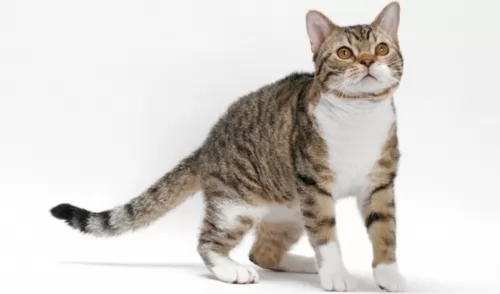 The American Wirehair started as a spontaneous mutation so that somewhere along the line, an unusual litter with this unique wiry type of fur was born.
The American Wirehair started as a spontaneous mutation so that somewhere along the line, an unusual litter with this unique wiry type of fur was born.
The cat hails from New York and it was in 1966 that a couple of barn cats had a litter of kittens, some of which were born with this peculiar wiry hair. Only one kitten survived – a male – and later it was discovered that the gene responsible for the wirehair coat was dominant so that only one parent required the gene to produce Wirehair offspring.
Today, all American Wirehairs are descendants of this one surviving male kitten. Today the breed is still fairly rare. It is, however, recognized by the four largest North American cat associations.
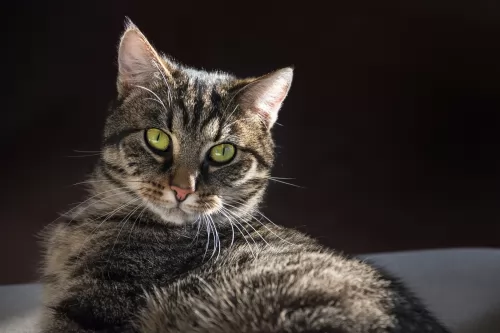 The European Shorthair is a cat breed that hails from Sweden but it also has roots that go back to the Roman Empire.
The European Shorthair is a cat breed that hails from Sweden but it also has roots that go back to the Roman Empire.
It is referred to as a natural cat breed, which means that the cat came about naturally without any human intervention.
The cat has had great hunting skills and this has what has made it sought after as a cat to keep rodents at bay. It became a famous housecat as well.
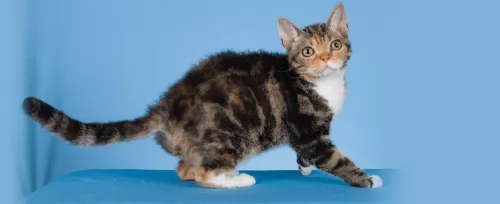 The American Wirehair is a medium-sized cat, strong and powerful, and can weight 5, 6 or 7 kg.
The American Wirehair is a medium-sized cat, strong and powerful, and can weight 5, 6 or 7 kg.
The head is in proportion to the body and the cat has a strong muzzle and chin. The ears are medium-sized and are rounded at the tips while the eyes are large, round, and set well apart.
It’s the coat that draws attention as unlike a regular cat’s silky fur, the fur of this cat is springy, coarse and wiry to the touch. The coat can be any color or pattern. It is the cat’s very coat that distinguishes it from all other breeds.
With this coat, the less grooming the better. Brushing or combing can damage it, so unless he is shedding heavily, leave it alone.
The only other care he needs really is nail trimming, to check inside his mouth for bad teeth and to also check inside his ears for redness. Both the teeth and the ears can be a source of pain for your pet.
The American Wirehair may have a harsh coat but there is nothing harsh about his personality at all. He is amicable and loving, getting on well with all members of his human family.
He is an independent cat and while he loves spending time with his family, he is quite capable of spending time on his own as well.
The American Wirehair is a playful cat so you want to give him some toys to entertain himself for when you’re not around.
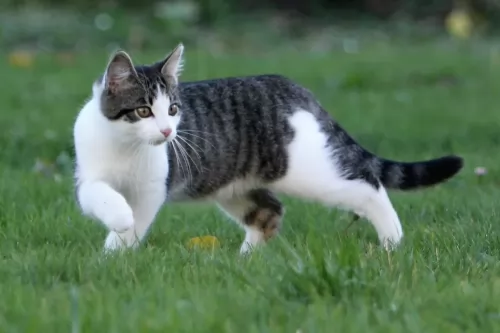 These domestic cats of Europe are a medium- to large-sized cat, weighing between 4 and 6kg, though some can be heavier.
These domestic cats of Europe are a medium- to large-sized cat, weighing between 4 and 6kg, though some can be heavier.
The European Shorthair has a fairly large head and medium-sized ears. The body is robust and round shaped. The cat’s short coat without an undercoat comes in a range of colors and patterns such as white, cream, red, black and blue with eyes that are green, yellow, brown or copper or blue.
The European Shorthair is known for its adaptable nature and the cat is able to fit into different lifestyles with ease. It's a cat that will live happily with children, pets, adults and seniors.
The cat loves his human family and loves becoming involved with fun games and activities. It's an intelligent cat too and cat food puzzles help him to think about how to get his food.
Even though your cat is social with his human family, it becomes fairly shy and nervous of strangers.
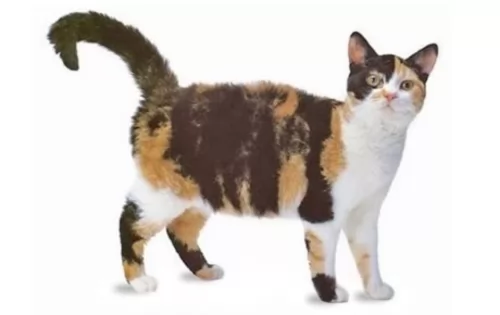 The American Wirehair makes a splendid pet, and while he isn’t the best breed for children, he can make a good pet with those children who have been taught kindness, gentleness and respect for animals.
The American Wirehair makes a splendid pet, and while he isn’t the best breed for children, he can make a good pet with those children who have been taught kindness, gentleness and respect for animals.
He is calm, quiet, dependent, and sociable and by providing him with a good home, he’ll prove to be a wonderful pet and companion.
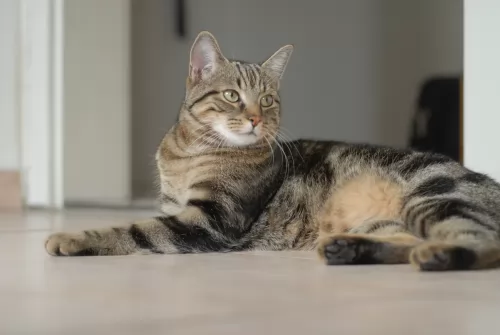 The European Shorthair is such a sweet cat and he is able to adapt fairly easily to new environments. It is such an ideal cat for households with singles, couples, families, and seniors as it adapts its personality to suit, getting on well with other pets as well.
The European Shorthair is such a sweet cat and he is able to adapt fairly easily to new environments. It is such an ideal cat for households with singles, couples, families, and seniors as it adapts its personality to suit, getting on well with other pets as well.
The cat loves his human family and wants to please, but loves to play too, being active and playful. Having one of these cats in your home is like bringing in a treasured gem.
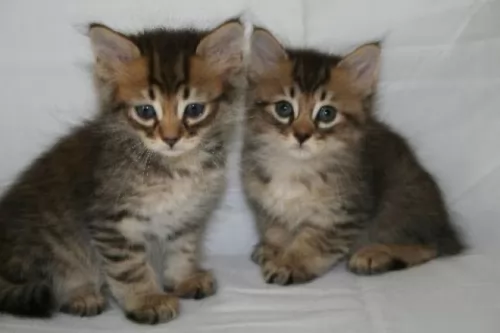 The American Wirehair is a healthy type of cat but any cat can develop health issues.
The American Wirehair is a healthy type of cat but any cat can develop health issues.
Be aware of Hypertrophic cardiomyopathy – a common form of heart disease in cats where there is the thickening of the heart muscle.
Be careful of overfeeding your cat as obesity is a major contributory disease to many illnesses that a cat gets. Excess weight can contribute to diabetes and arthritis and put pressure on your cat’s joints. Certainly, carrying extra weight can shorten your cat’s life. Make sure your cat gets smaller, healthier meals and that he is active and exercised.
 Even if your European Shorthair appears to be well, it is a good idea to get used to taking your cat to the vet for an annual check-up.
Even if your European Shorthair appears to be well, it is a good idea to get used to taking your cat to the vet for an annual check-up.
To provide your cat with the best chance to remain healthy, good diet and exercise is imperative. Look out for an itchy skin too as this could well be a sign that your cat is being plagued by parasites. Parasites can be a terrible problem and it will need to be attended to by your vet.
Parasites and an itchy skin can be a nightmare for your pet and make him most miserable with excessive scratching and licking as well as thinning of hair.
A new kitten will also require being vaccinated to ensure he remains healthy. These injections protect your cat from life-threatening diseases. Usually, vets start vaccines at between 8 – 12 weeks of age to protect your cat against the likes of Feline Leukaemia Virus, Feline Infectious Enteritis and Cat Flu.
There are also other vaccinations you might want to consider such as rabies and chlamydia.
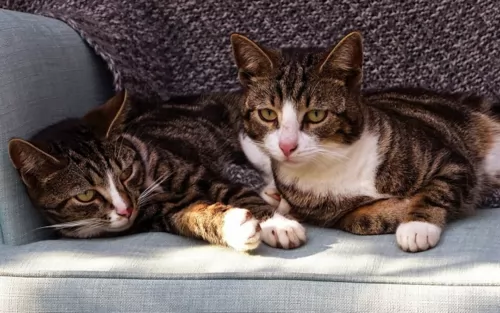 Brush the cat gently once a week. Your cat will love the connection you and he has. While you brush him, make a point of checking inside his ears and inside his mouth as well. It is also time to trim his nails. If you are hesitant to do this, ask you vet for suggestions or you can make use of a pet groomer too.
Brush the cat gently once a week. Your cat will love the connection you and he has. While you brush him, make a point of checking inside his ears and inside his mouth as well. It is also time to trim his nails. If you are hesitant to do this, ask you vet for suggestions or you can make use of a pet groomer too.
Make sure your pet cat is free from parasites such as fleas, ticks and heartworm. Your vet can recommend a treatment and it is also a good idea to talk to your vet about vaccines for your cat.
Have your American Wirehair spayed or neutered to prevent unwanted kittens and to promote better health for your cat.
Always choose healthy food for your pet, bearing in mind that cats are carnivores, which means that you need to choose cat-food for your pet that has fish and meat in it. It can be difficult making good homemade food for your cat but there are excellent commercially prepared cat foods to ensure your cat gets the correct balance of nutrients and calories. Bear in mind that your cat's nutritional requirements change through their different stages of life.
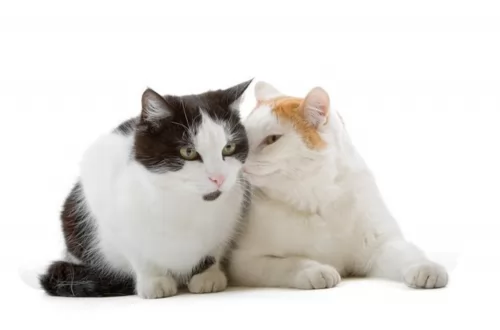 European Shorthairs like to groom themselves, but even so, you want to brush your cat once a week to keep the hair shiny and healthy. Make sure to trim your cat’s claws at the same time. It’s your time to feel for any unusual lumps or scratches on your feline friend’s skin. Check his eyes and make sure they are still bright and clear, look inside the ears to make sure they aren’t becoming clogged with dirt and wax and look inside the mouth to ensure no signs of gum- and tooth disease.
European Shorthairs like to groom themselves, but even so, you want to brush your cat once a week to keep the hair shiny and healthy. Make sure to trim your cat’s claws at the same time. It’s your time to feel for any unusual lumps or scratches on your feline friend’s skin. Check his eyes and make sure they are still bright and clear, look inside the ears to make sure they aren’t becoming clogged with dirt and wax and look inside the mouth to ensure no signs of gum- and tooth disease.
Your cat may well be outgoing with his human family, but his nervousness with strangers will require you providing him with a safe haven of his own. This might be his own bed which should be in a safe, dry, quiet area where he can retreat and feel more secure.
European Shorthairs love being outdoors and particularly if you have a female you’ll want her spayed to avoid her becoming pregnant. Cat shelters are already full of unwanted kittens and you don’t want to add to the burden. Also, have your male neutered too as he is ar less likely to want to roam. Spaying and neutering come with many health benefits too.
Be very careful of your cat’s diet. This is because the domestic cat is a carnivore and still essentially a predator, liking to hunt for their meat. They require a meat diet. However, cats have special dietary requirements and they require a balanced diet. All cats are individuals and they have different food likes and preferences, but they all need the best food there is to remain in peak condition. If you feed your cat commercially manufactured food, always follow the instructions on the label.
Provide your feline pet with cat accessories – food and water bowl, collar and tag, soft bedding, a climbing tree, scratching post, litter box, grooming accessories and toys.